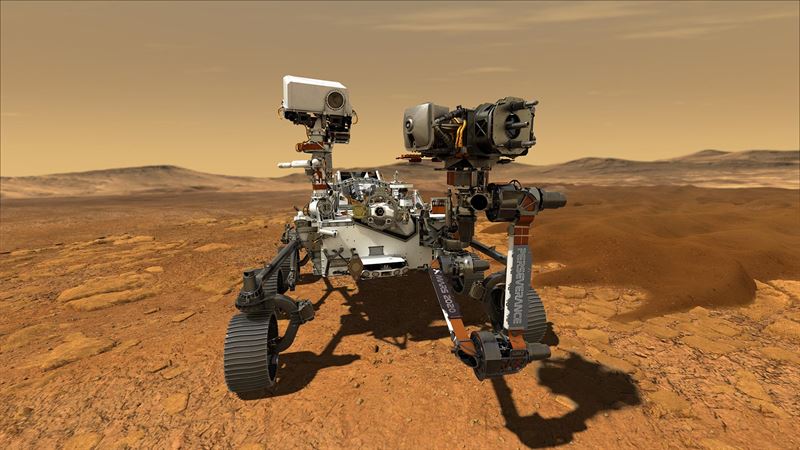SKF bearings help Mars Rover collect rock and regolith samples on the planet’s surface

Each time the Perseverance Mars Rover collects or handles rock and regolith samples in Jezero Crater during its multiple-year mission on the surface of the red planet, key components from SKF will facilitate that those activities successfully take place
Gothenburg, Sweden 7 April, 2021: Enabling the Mars Rover’s core operations in the harsh environment on Mars are Kaydon RealiSlim thin-section ball bearings, designed and manufactured by SKF at the company’s global thin-section bearing engineering center in Muskegon, and its recently expanded manufacturing hub in Sumter, USA.
These highly engineered components contribute to the survival of the rover’s main robotic arm, sample collecting turret, tool bit carousel and sample handling assembly during a months-long trip through space, and its function as intended on the Mars surface.
SKF also supplied critical bearings for the mission’s launch vehicle which carried the rover and its lander into space.
SKF bearings will play an integral role in the vital process of sample collection on Mars. When the rover is ready to begin collecting samples on the surface, the robotic arm will maneuver into place and the tool bit carousel will whirr into action, deploying tools to drill or abrade material, which will then be collected by the sample collecting turret (aka “the hand”) and transferred to the sample handling assembly for processing onboard the rover, and eventually a potential return to Earth for analysis via a future Mars mission.
“The bearings we designed and built to help the rover perform its core science activities were based on several models of Kaydon thin-section ball bearings customized by our engineers to minimize weight and save space, while retaining maximum functionality and reliability for a mission where repair or replacement is simply not an option,” said Isidoro Mazzitelli, Director of Product Development and Engineering Americas. Space applications must be a small fraction of the weight of standard bearing assemblies.
Kaydon bearing solutions are often customized from baseline models for specific customers and commonly used in applications that require a careful balance between strength, weight, size, functionality and reliability – including robotic surgical equipment, automated precision manufacturing, detailed painting, aircraft systems, airport security scanners and medical CT imagers.
In addition to the latest mission, SKF has a decades-long history as a supplier to global space programs, dating all the way back to NASA’s Apollo 11 mission. “Our company’s bearings, seals and other products have helped enable a wide range of spacecraft and missions for more than 40 years,” said John Schmidt, President, SKF USA, Inc. “Our parts have flown on the previous space missions, dozens of commercial and government satellites, space-borne telescopes, a wide range of rocket launch vehicles and in astronaut’s spacesuits. When conditions become critical and applications demanding, engineering knowledge is the only way to success.”
For further information, please contact:
Press Relations: Nia Kihlström, +46 31-337 2897; +46 706 67 28 97; nia.kihlstrom@skf.com
SKF’s mission is to be the undisputed leader in the bearing business. We do this by offering solutions that reduce friction and CO2 emissions, whilst at the same time increasing machine uptime and performance. Our products and services around the rotating shaft, include bearings, seals, lubrication management, artificial intelligence and wireless condition monitoring. SKF is represented in more than 130 countries and has around 17,000 distributor locations worldwide. Annual sales in 2020 were SEK 74 852 million and the number of employees was 40,963. www.skf.com
® SKF is a registered trademark of the SKF Group.
Tags:




